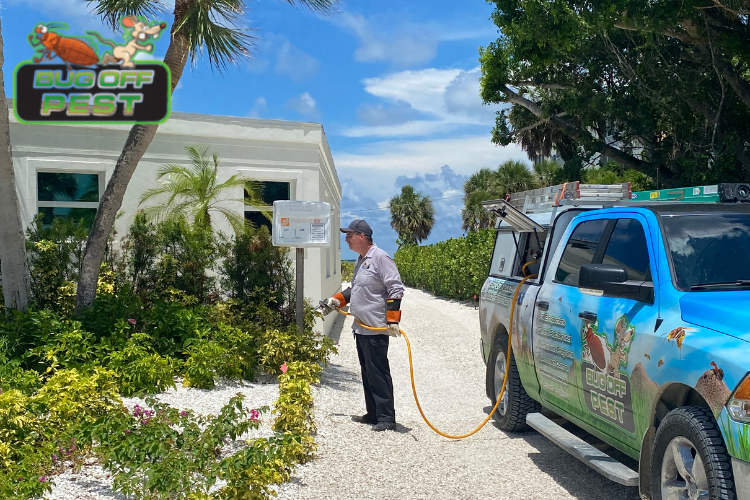Exploring Innovative Techniques and Products for Effective Pest Control
The landscape of parasite control is progressing, marked by the appearance of ingenious methods and items made to improve effectiveness and sustainability. From clever traps geared up with advanced tracking systems to organic methods that employ all-natural killers, these advancements offer a standard shift in just how we approach pest monitoring. Green chemical choices and pheromone interruption techniques offer targeted options that straighten with ecological stewardship. As the market faces these growths, a closer exam reveals not just their effects yet additionally the prospective challenges that might occur in their implementation.
Smart Traps and Keeping An Eye On Systems
Exactly how can modern-day technology boost pest monitoring? One substantial advancement is the advancement of wise traps and checking systems, which provide real-time data and analytics for effective bug control. These systems use sensing units and wireless technology to discover bug task, notifying residential or commercial property managers and bug control specialists to infestations before they rise.
Smart traps are geared up with features such as bait stations that bring in pests and record them successfully. These traps can be kept an eye on remotely, permitting for timely interventions and reducing the need for extensive chemical applications. Furthermore, the integration of artificial intelligence algorithms makes it possible for these systems to distinguish in between target insects and non-target varieties, improving the accuracy of parasite control actions.
In addition, the information accumulated from wise catches can be assessed to identify patterns in parasite actions and ecological aspects adding to infestations (Pest Control in Port Charlotte). This information is vital for establishing targeted parasite administration methods tailored to specific environments. By accepting wise traps and checking systems, bug control experts can enhance their operational efficiency and lower the environmental influence of bug management, inevitably causing safer and extra sustainable practices in the market
Biological Pest Control Methods
Using all-natural killers and bloodsuckers, biological insect control methods offer an eco friendly choice to chemical treatments. This technique involves the intro or enhancement of certain microorganisms that can normally regulate parasite populations, therefore decreasing dependence on artificial pesticides. Typical examples consist of making use of ladybugs to manage aphid infestations and parasitical wasps to target caterpillars.

Biological control can be categorized right into three primary techniques: timeless, augmentative, and preservation. Classical biological control involves importing all-natural adversaries from the bug's indigenous habitat, while augmentative control involves boosting the populace of existing all-natural opponents through releases. Preservation techniques concentrate on developing problems that support these valuable microorganisms in the environment.
The performance of biological insect control pivots on understanding the complex interactions within ecosystems. It typically requires a comprehensive assessment of insect characteristics and the life cycles of both the parasites and their all-natural adversaries. While biological techniques might not supply immediate results like chemical alternatives, they add to lasting insect management and ecological community wellness. As awareness of environmental concerns grows, organic bug control approaches are progressively acknowledged for their sustainable duty in incorporated bug management programs.
Eco-Friendly Chemical Alternatives
Eco-friendly chemical alternatives supply a sensible solution for insect monitoring that minimizes ecological impact while successfully controlling insect populations. These options are stemmed from natural resources and are very carefully formulated to target particular parasites without damaging beneficial organisms, making them a necessary element of sustainable pest control approaches.
Amongst one of the most reliable eco-friendly options are plant-based insecticides, such as neem oil and pyrethrin, which are acquired from the seeds and flowers of numerous plants. These materials interfere with the life cycles of pests, decreasing their populaces without the poisonous effects associated with traditional chemicals - Pest Control in Port Charlotte. In addition, necessary oils like peppermint and clove oil display repellent residential properties, additionally improving their utility in parasite monitoring

Moreover, environmentally friendly chemical choices frequently damage down much more quickly in the atmosphere, minimizing the threat of soil and water contamination. This particular aligns with the boosting customer demand for lasting techniques in additional info farming and city parasite control. As research study proceeds to advance, the growth of cutting-edge eco-friendly solutions will certainly further enhance efficacy and expand application locations, enabling pest monitoring professionals to embrace greener, more liable approaches in their practices while safeguarding human health and the atmosphere.
Scent Disruption Strategies
An additional ingenious technique in sustainable bug administration is the usage of pheromone interruption techniques. These methods make use of the all-natural chemical signals, or pheromones, that bugs utilize for communication, especially in breeding habits. By interfering with these signals, pest populaces can be successfully handled without turning to harmful chemicals.
Pheromone traps are generally employed in this method. Over time, this can lead to a substantial my response decline in pest populaces.

Integrated Pest Monitoring Techniques
Reliable parasite control often needs an extensive approach, and Integrated Bug Management (IPM) methods offer a framework for attaining this objective. IPM incorporates different administration techniques to reduce bug populations while minimizing reliance on chemical pesticides. go to my blog This complex technique begins with detailed surveillance and identification of bugs, permitting targeted treatments based upon specific insect stress.
Cultural techniques, such as plant rotation and cleanliness, play a vital function in avoiding insect facility. Organic controls, including natural killers and parasitoids, are employed to preserve pest populations at workable degrees. When essential, selective chemical treatments are used, stressing lower poisoning to non-target varieties and the environment.
By utilizing this holistic technique, IPM not only improves bug control effectiveness however likewise contributes to lasting environmental balance. Ultimately, Integrated Insect Administration stands for a forward-thinking service that lines up farming performance with ecological stewardship, making it necessary in contemporary insect control strategies.

Final Thought
In verdict, the combination of innovative strategies and products for reliable bug control represents a significant development in sustainable insect management. Smart catches and monitoring systems, organic insect control techniques, green chemical options, and pheromone disruption methods collectively boost the effectiveness of pest administration methods.